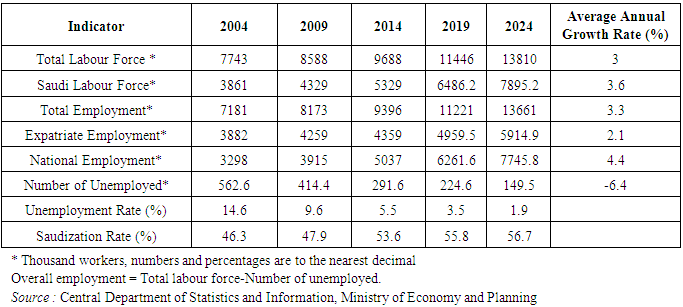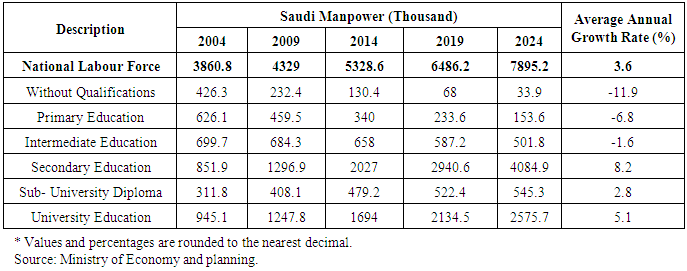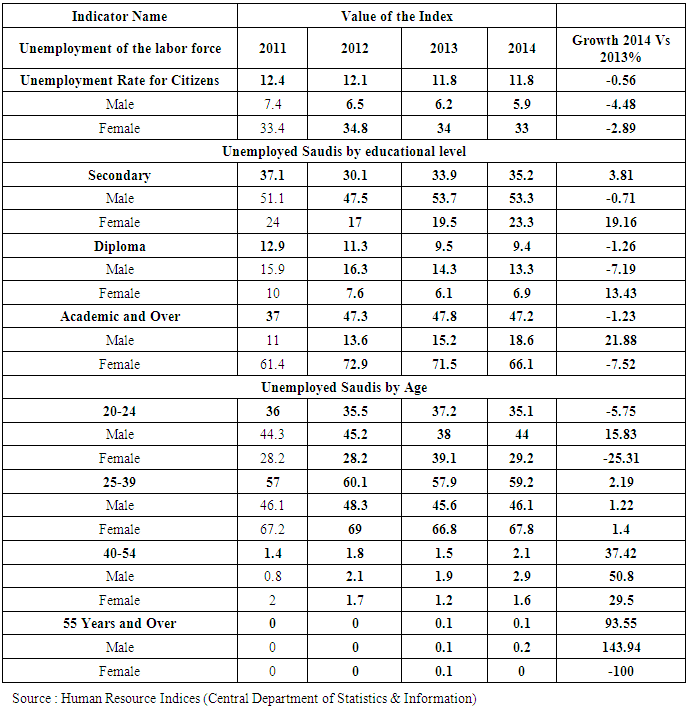-
Paper Information
- Paper Submission
-
Journal Information
- About This Journal
- Editorial Board
- Current Issue
- Archive
- Author Guidelines
- Contact Us
Human Resource Management Research
p-ISSN: 2169-9607 e-ISSN: 2169-9666
2016; 6(1): 1-5
doi:10.5923/j.hrmr.20160601.01

Exploring Recent Saudi Human Capital Development Initiatives: An Evaluation
Deepanjana Varshney
HRM department, King Abdulaziz University, Jeddah, Saudi Arabia
Correspondence to: Deepanjana Varshney, HRM department, King Abdulaziz University, Jeddah, Saudi Arabia.
| Email: |  |
Copyright © 2016 Scientific & Academic Publishing. All Rights Reserved.
This work is licensed under the Creative Commons Attribution International License (CC BY).
http://creativecommons.org/licenses/by/4.0/

One of the major challenges of Saudi Arabia is an acute shortage of skilled and unskilled domestic work force. However, the country has been making intense efforts to address the human capital development challenges to match the needs of the labor market. This gradual transition from an oil-based to a knowledge-based economy calls for a radical increase in the country's human capital at a short span of time. This paper aims to analyze the recent initiatives in the human capital development of the country. Herein the labor force pattern has been evaluated in terms of its deployment according to the different demographic parameters over the period of time. The results of the study reveals an over-reliance on expatriate workforce, and oil and consequently there are serious efforts towards developing a knowledge-based economy and competent local workforce. Select discussion of cases of latest HRD programs highlight the salient goals, eventual proposals with future implications.
Keywords: Competency, Human Capital, Labor, Saudi Arabia, Skill
Cite this paper: Deepanjana Varshney, Exploring Recent Saudi Human Capital Development Initiatives: An Evaluation, Human Resource Management Research, Vol. 6 No. 1, 2016, pp. 1-5. doi: 10.5923/j.hrmr.20160601.01.
1. Introduction
- [1] describes human capital as the distinct or a talented group of employees who enjoy enhanced high-end knowledge and expertise that will enable them to renewed tender and transform the organization's resources to the possibilities of practical levels of advanced process capabilities. Additionally, [2] has rightly focused on the significance of building human capital requirements, which consists of the creation of suitable environment, blend, scientific research, ingraining the concept of knowledge and the creation of a knowledge base. According to [3], in high -income countries human capital constitutes 80 per cent of the total wealth and this huge amount of capital takes a long time to gather. Human capital does not simply spring out of newly built schools and universities. It is the result of a society-wide long- term process in which not only the formal education system but also families and workplaces play a major role. Along with cognitive ability, intrinsic motivation for learning and working, initiative, thrift, and perseverance determine how fast human capital accumulates in society.
2. Background
- A study of the Saudi human capital context reveals severe challenges. In year 2014, Saudi population growth rate was 2.10% and Saudi’s unemployment rate (>15 years) was 11.70% [4]. Ironically, it has been also found that the job market cannot cater to the demands and the unemployment rates have been mostly stagnant for last 2-3 years. The youth and the females are the most affected by unemployment where 59.2% of Saudis between the ages of 25 and 39 years have been unemployed followed by 35% of Saudis aged between 20 to 24 years .Apart from this, Saudi’s with Academic and over are among the most unemployed section with 47.2%. These figures indeed remain a critical source of concern for the policy-makers [4]. Despite these numbers, the Kingdom was reported as one of the top 10 countries in world spending the most on education [5]. The average Saudi student's performance was found to be below the standard global performance. It has been estimated that over two thirds of students do not conform to the international standards [6]. In discussing the human capital aspects from the Saudi Arabian perspective, we would also like to point out that the country still has heavy dependence on its abundant oil reserves. Nevertheless, the kingdom's survival in the long-term is subject to its capacity to break away from the shackles of oil-reliance and develop a diversified knowledge-based economy. We witness in recent times that the policy-makers are concentrating the movement towards a knowledge-based economy, especially in the Ninth development plan. The key aspects of the Tenth Development Plan also reveal two major thrusts: diversification from the oil economy and the creation of jobs for the Saudi citizens. Although Saudi Arabia presents a highly closed and conservative context, it is a rapidly developing nation.“International competitiveness is likely to … impact significantly and possibly irrevocably on Saudi cultural traditions and religion norms” [7]. Many researchers such as [8], [9], and [7] noted that the Saudi government’s primary aim is to lessen the dependence on its oil industry that is predicted to come to an end in less than 100 years. Building a knowledge-based economy demands the competencies of a domestic workforce to tackle the employment problem. In recent years the school and higher education have been subjected to new measures however, there is a clear gap between policy and practice of policy-makers duo to the strong tendency toward conservatism ([10]; [11]; [12]; [13]; [14]). The higher education sector in Saudi Arabia is facing many challenges including shortages of well- trained professors, a rising cost of education, and limited higher education infrastructure.
3. Initiatives
- According to the Ninth Development Plan, a huge budget of $195 billion was allocated for the educational reforms for 2010-2014, which amounted 50.6% of the total allocations of the development sectors. Simultaneously, the progress in terms of infrastructure, content development and faculty training and development were stupendous and in a way became an uphill task to examine the quality of efforts used into the initiatives [15]. In a way all major institutes, colleges and universities have established regulatory bodies to set the standards, implement quality assurance policies and measure the quality. There has been the deep-rooted realization by the policy-makers about the urgent collaboration of the public and the private bodies to endure effective results in the higher education and the employment scenarios. This definitely ensures a faster way of tracking down the needs in terms of research, resource development, forms of education, and related support services. Such a strategy will minimize the management load and enable the management to concentrate on core educational aspects and by outsourcing non-core education activities to the private sector [16].
|
|
|
4. Suggestions
- As discussed above the Saudi human resources (especially, the youths) should be continuously trained in the requisite skills. The kingdom has a significant young population who can be trained in the technical and vocational areas, as past results show that this has adequately reduced skill imbalances in the labour market. A solid educational foundation would be a strong support for enforcing effective Saudization programs. [18] had stated that the policy implications should concentrate on education, training, quality systems, telecommunications systems to promote SME-based employment growth ([9]; [18]; [19]; [20]; [21]).The focus should be to develop the Saudis for high-skilled jobs. In doing so the organizations have to oversee professional collaborations between Saudis and the expatriates in the organizations. Hence instead of radically removing expatriate employees from the system, sufficient time should be devoted to take their professional support to hone the Saudi employees’ skills and then phase them off with a good note.
 Abstract
Abstract Reference
Reference Full-Text PDF
Full-Text PDF Full-text HTML
Full-text HTML

